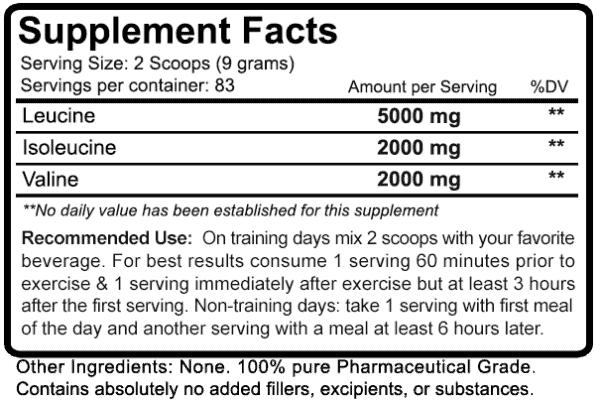BCAA's Stop Wasting Money
Branched Chain Amino Acids (BCAAs) are one of the most popular fitness supplements available. BCAAs have been marketed as being able to preserve muscle in dieting conditions, help stimulate protein synthesis during the day and help to fuel your workouts. In this article, I will review the literature on BCAAs and why there is no reason to spend your hard-earned cash on this supplement!
What are BCAAs?
Protein is made up of amino acids; there are 20 amino acids that can be combined to form countless types of proteins. Of these amino acids, 3 of them are predominantly responsible for muscle protein synthesis (MPS), the process through which you build muscle.
These are the three branched-chain amino acid: leucine, isoleucine and valine.
Specifically, MPS is driven by leucine; 2-3g of leucine are needed per meal to both stimulate and maximize MPS. If you do not consume enough leucine, you do not stimulate MPS. If you consume more leucine, no extra-muscle growth happens. The effect gets maximized immediately.
The Claims for BCAAs: You’ve Been Marketed
Since leucine is the primary trigger for MPS, it has been hypothesized that consuming BCAAs intra-workout or between meals could help to trigger additional muscle-growth at key points in the day because it contains leucine in a concentrated amount. Further, many people who train early in the morning or fasted opt to have scoop or two of BCAAs before and during training.
It has also been proposed that BCAAs can help with the retention of muscle during a weight-loss phase. Finally, it is commonly said that BCAAs can boost exercise performance.
The Truth About BCAAs
Now it is time to look at the scientific evidence to build an educated perspective on this supplement and the claims that are made to market it.
Leucine supplementation does not cause additional muscle protein synthesis. The research has shown that 0.82g/kg of protein is already enough to maximize protein synthesis in the body. This protein intake has been shown to maximize protein synthesis in both novices and advanced athletes, also in calorie-restricted or caloric surplus conditions. If you consume extra amino acids from BCAAs, you will not be able to increase protein balance because it has already been maximized due to adequate protein intake. Even directly consuming leucine has not been shown to have benefits on muscle growth. [1]
Consuming BCAAs prior to fasted training. The theory behind this argument is to get amino acids in the blood before working out. Research has shown that after an overnight fast, amino acids have a better uptake when taken before training than after [2]. People often opt for BCAAs because they think they are calorie-free and won’t break the fast. However, BCAAs do contain calories; they contain 4kcal/g and should be counted toward your daily protein intake. The only reason the FDA does not consider their caloric value is because the amino acids are in free form and are not a complete protein. Further, research has shown that a full spectrum of essential amino acids (EAAs) are needed to sustain the MPS response for a longer period of time [3]. Thus, consuming EAAs would be superior to consuming BCAAs. Better yet, a high quality protein source such as whey or eggs only requires 0.11g protein/lb body weight to stimulate protein synthesis [4]. Thus, a 150lb person would only need about 16g of a high quality protein pre-workout to stimulate muscle-building. This amount of protein can be found in about half a scoop of most high-quality protein powders. Opting for the full-protein seems to have greater benefits than simply having BCAAs.
BCAAs do not help with muscle retention, even in dieting conditions. A recent study was performed where the researchers observed the effects of BCAAs versus placebo on body composition in a group of calorie-restricted men [5]. This was the big study used to advocate BCAAs since it showed better body composition changes for the BCAA group. However, it was found that the authors wrote a conclusion that did not reflect the real results. In reality, there was no difference in muscle retention, muscle gain or fat-loss between the BCAA and placebo group. The study has been addressed and corrected since [6].
Lastly, BCAAs do not improve exercise performance. A study by Spillane et al. compared the effects of consuming 4.5g BCAAs pre and post workout compared to taking placebo [7]. The effects were observed in a typical, 4 day per week upper/lower split. The researchers found no difference in body fat, lean muscle mass or exercise performance between the BCAA and placebo group.
No Evidence to Support BCAA Use
The evidence does not show that using BCAAs is beneficial. They have not shown an ability to help retain muscle, build more muscle, or lose fat when protein intake is adequate. A small amount of protein or full spectrum essential amino acids is superior to BCAAs prior to training. Lastly, they do not boost exercise performance.
These factors make BCAAs into really expensive water sweeteners that contain calories. If you like the taste of BCAAs, then you can save money and calories by buying a calorie-free water sweetener. Otherwise, consume adequate protein and save your hard-earned money!
Stop Wasting Money and eat real food with quality protein!
Want to see more of the food I use daily to hit my protein goals?




Check out my newest low-calorie recipe book that includes all of these recipes and making your protein goals easy to hit!
References
1. Aguiar AF, Grala AP, da Silva RA, Soares-Caldeira LF, Pacagnelli FL, Ribeiro AS, da Silva DK, de Andrade WB, Balvedi MCW. Free leucine supplementation during an 8-week resistance training program does not increase muscle mass and strength in untrained young adult subjects. Amino Acids. 2017 Jul;49(7):1255-1262. [PMED]
2. Tipton KD1, Elliott TA, Cree MG, Aarsland AA, Sanford AP, Wolfe RR. Stimulation of net muscle protein synthesis by whey protein ingestion before and after exercise. Am J Physiol Endocrinol Metab. 2007 Jan;292(1):E71-6 [PMED]
3: Churchward-Venne TA1, Burd NA, Mitchell CJ, West DW, Philp A, Marcotte GR, Baker SK, Baar K, Phillips SM. Supplementation of a suboptimal protein dose with leucine or essential amino acids: effects on myofibrillar protein synthesis at rest and following resistance exercise in men. J Physiol. 2012 Jun 1;590(11):2751-65. doi: 10.1113/jphysiol.2012.228833 [PMED]
4: Moore DR, Churchward-Venne TA, Witard O, Breen L, Burd NA, Tipton KD, Phillips SM. Protein ingestion to stimulate myofibrillar protein synthesis requires greater relative protein intakes in healthy older versus younger men. J Gerontol A Biol Sci Med Sci. 2015 Jan;70(1):57-62. doi: 10.1093/gerona/glu103. [PMED]
5: Dudgeon WD, Kelley PE, and Scheett TP. In a single-blind, matched group design: branched-chain amino acid supplementation and resistance training maintains lean body mass during a caloric restricted diet. J Int Soc Sports Nutr. 2016; 13: 1. [PMED]
6: Dieter BP, Schoenfeld BJ, Aragon AA. The data do not seem to support a benefit to BCAA supplementation during periods of caloric restriction. J Int Soc Sports Nutr. 2016 May 11;13:21 [PMED]
7: Spillane M, Emerson C, Willoughby DS. The effects of 8 weeks of heavy resistance training and branched-chain amino acid supplementation on body composition and muscle performance. Nutr Health. 2012 Oct;21(4):263-73. [PMED]
